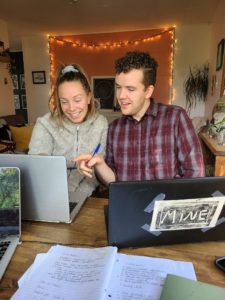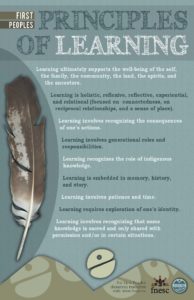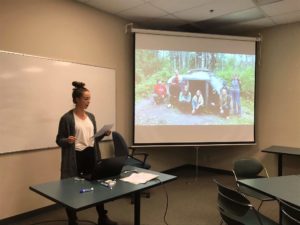 There were an incredible amount of important learning takeaways from this professional development day. Professional development days have been extremely valuable to me as a new educator because they allow me to explore so many new ways of thinking and and teaching.
There were an incredible amount of important learning takeaways from this professional development day. Professional development days have been extremely valuable to me as a new educator because they allow me to explore so many new ways of thinking and and teaching.
This day fostered community, collaboration, and respect. It was a great chance to re-connect with fellow educators as well as create new relationships within my learning community. One of my most impactful learning moments came from listening to the keynote speaker, Dr. Niigaanwewidam Sinclair, share his wisdom. A powerful learning moment for myself came when Dr. Sinclair spoke of community. In Indigenous cultures, community and connection are important values that should also be extended into our classroom. The idea of fostering and creating a community by paying attention to the “little things” made a somewhat intimidating and daunting task as a new educator seem attainable and enjoyable. Dr. Sinclair suggested that all we need to do as individuals is make simple changes to our everyday lives in order to become apart of a larger community. Learn how to cook a local Indigenous dish, during your daily walk attempt to identify indigenous plants, learn how to say a few words in the local Indigenous language, or even read a novel by an Indigenous author. I loved this simple yet powerful idea because it provided me with the guidance that I personally needed in order to start incorporating more Indigenous ways of living and thinking into my life and pedagogy. Another great piece of learning I took away from this day during Dr. Sinclair’s keynote speech was the need to support and empower Indigenous youth in our education systems. It is incredibly important that Indigenous youth are given the same opportunities as other students and are made to feel welcome. It is our responsibility as educators to be the catalysts for reconciliation, inclusivity, and change.
What I learned during this day has many connections to teaching and learning in the British Columbia school system. A connection I made was in context to the First Peoples’ Principles of Learning. The principle that states “learning is holistic, reflexive, reflective, experiential, and relational (focused on connectedness, on reciprocal relationships, and a sense of place” (from Jo Chrona’s blog https://firstpeoplesprinciplesoflearning.wordpress.com/) connects my personal learning moments from this day to education. BC’s new curriculum now emphasizes the importance of communication and collaboration, creative and critical thinking, personal and social awareness and responsibility, and positive personal and cultural identity (https://curriculum.gov.bc.ca/). It is so interesting to now have the ability to reflect, as well as enough awareness as an educator and learner to see the purposeful connections that British Columbia has made in to Indigenous ways of learning. The holistic nature of Indigenous education truly speaks to me, not only as a teacher who is passionate about teaching the whole student, but as a person who is continuously learning and adapting. Coming together to learn as a collaborative group full of vastly experienced and skillful people, even though it was online, gave me a chance to reflect on my learning journey and on all the different experiences over the past year that have brought me this far.

Moving forward, I aim to bring more aspects of Indigenous learning into my next practicum classroom in terms of content and ways of teaching and thinking. I want to do this in a way that honours myself and the history of people and place. I need to remember it is okay to make mistakes as long as there is always a genuine effort to learn, reflect, and adapt. This goal was prompted by the conversation/question panel. During part of Dr. Sinclair’s speech there was a discussion going on about non-indigenous educators teaching Indigenous education and the responsibility, and attitude that must accompany it. It was also mentioned that it is okay to still be in a learning phase as long as you continue to be respectful and genuine. It comforted me to know that it is okay to make mistakes as this has been a reoccurring anxiety for me as a new educator who is still continuously learning lots about Indigenous education and culture. As I near my next practicum, my goal is to confidently embrace any discomfort that arises in order to be a true ally in reconciliation.
